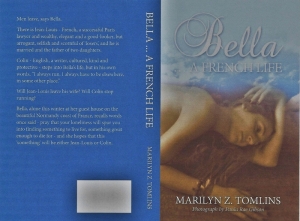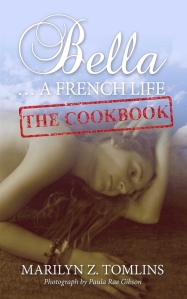I set the tea things out in the drawing room, on a coffee table which stands between the room’s two bay windows. It is cool in the room. In the days when we received guests in winter the fireplace was always lit, Fred having loaded it each morning with logs, but with me alone here in the winter, its role has become merely decorative, its red bricks cold to the touch.
I sit down on an armchair facing the coffee table.
Colin walks in. He has changed into jeans and a black polo-necked sweater. His hair is wet: he would have had a quick shower. He is holding the cellophane-wrapped basket with both hands.
“Bella, I could not resist buying you a small gift. I hope you will like it.”
Hesitatingly, he holds the basket out towards me.
I get up and take the basket from him, the paper crinkling under our hands.
“How wonderful. Thank you, Colin. How kind of you.”
My mother drilled it into Marius and me never to say ‘you should not have’ when given a gift.
“Shall I help you with the wrapping?” asks Colin.
“Please do. Yes. Thank you.”
I put the basket down on another coffee table: the basket will hold fruit or chocolates or perhaps a bottle of champagne.
“Let me,” says Colin.
Our hands touch. Quickly, each draws back.
The pretty red bow is a ready-tied one, an elastic band holding it in place.
“Like a bow tie,” he says. “Not that I wear them. My brother does.”
I take the bow from him and so too the ribbon. All along the ribbon is the name Fauchon.
“I know a little girl who would want these for dressing up her dolls,” I say.
I lied: I want to keep the bow and the ribbon as a remembrance of this man. These will go into the box where I keep other such knick-knacks in remembrance of things past: sugar lump wrappers from when Jean-Louis and I had coffee after dinner in restaurants; pine cones and conkers from when Jean-Louis and I took autumnal walks in the Tuileries Gardens. A booklet of matches from the hotel where he and I had stayed in Rochers-de-Naye.
Colin’s gift is a selection of exotic fruit: a still-life of yellow, green, orange and red fruits I have never seen before.
“May I?” Colin asks.
He takes the smallest item from the basket, a tiny, crispy, bell-shaped fruit, and carefully, as if it is fragile, places it onto the palm of my right hand.
“What is it?” I ask.
“Come,” he says, “it can be sticky, so I will open it for you.”
He loosens the outer part of the fruit, a husk as thin and crispy as paper, and he holds up a perfectly round yellow berry.
“Come,” he says again.
Holding the fruit by the tiny stem underneath it, he brings his hand up to my mouth. Keeping my eyes down and on his hand, like a baby who has seen its mother’s nipple, I open my mouth.
His fingers brush against my lips.
“Oops, sorry.”
He lets go of the berry and it drops onto my tongue.
With my tongue, I roll the berry around in my mouth and, next, I bite into it. I chew slowly, my eyes on Colin’s: they are anxious, waiting for my response. The taste on my tongue is not one of sweetness but acidity. Refreshing mellow acidity.
Somewhere in the night, an owl hoots.
He flicks his head towards the bay window behind us.
“A storm is on its way.”
We are only a few centimetres apart: I am still holding the hand with which he had fed me the berry. Quickly, I let go of the hand.
“Delicious,” I say of the berry.
I give a step away from him.
“It is a gooseberry.”
“So, that’s a gooseberry! My mother used to tell my brother and I about the gooseberry tree which stood in the garden of their home when they were children. She used to tell us what a little hardy tree it was. They never watered it or trimmed it and each summer it produced the sweetest berries. My father said in Germany it was called a Stachelbeere. The thorn berry. There were a few people in his life who were thorn berries.”
“Stachelbeere? Stachelbeere? Good name.”
“I too have … had them in my life,” I say.
“I too have had them.”
“But no longer?”
He shakes his head.
“They are still there but I’ve come to ignore their existence.”
“Lucky man. I cannot ignore my thorn berries.”
“Bella, I hope my presence here … here at Le Presbytère is not a thorn berry. Will not be a thorn berry.”
His eyes are bearing a strange look. I cannot interpret it. Or can I and I do not want to acknowledge its message?
“Let’s have our tea, Colin,” I say.
“Sure,” he says. “Let’s.”
-0-


